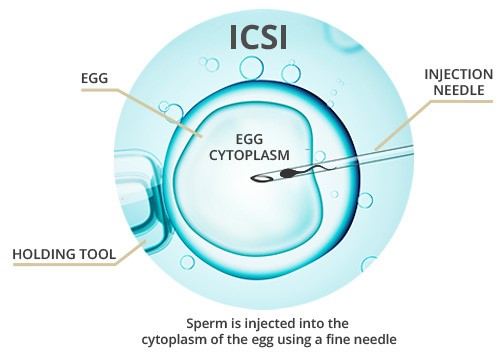
Intra Cytoplasmic Sperm Injection
Infertility is a prevalent condition with significant social and psychological impact. Thirty percent of couples seeking treatment for infertility re unable to conceive solely due to male related problems. Impaired sperm performance in conjunction with other female factors is noted in an additional 20 percent of patients.
In 1992 an aggressive Subzonal attempt in Belgium resulted in ICSI technology which spread quickly and revolutionized the treatment of male factor infertility. Prior to the advent of ICS, male factor infertility cases during ART therapy had the poorest clinical outcomes. Couples with severely compromised semen parameters were not accepted into IVF programs and, the ones who were accepted failed to proceed to embryo transfer as the initial hurdle of achieving fertilization was not crossed. This advanced form of IF called ICSI has revolutionized the treatment of male infertility. ICSI has given hope to many men, who previously had little chance of fathering their own children.
ICSI involves injecting a single sperm into the egg using a veryfine needle.
Most couples with severe male factor infertility can now be treated utilizing ICSI, which requires only one sperm cell with a functional genome and Centrosome for the fertilization of each oocyte. Spermatozoa can be surgically retrieved from the epididymis o testis in the case of absence ejaculatory sperm. Artificial insemination with sperm is currently being used when ICSI with spermatozoa from the ejaculate, epididymis or the testis cannot be used or has failed It also may be used for couples who prefer artificial insemination because of financial, psychological, ethical or genetic considerations.
Indication of ICSI are
Severe Oligoasthenospermia (Very poor sperm counts & motility), Obstructive azoospermia (No sperms in semen), Repeated failed IVF. 90% of patients who have obstructive azoospermia can be benefitted by aspirating sperms by MESA/ TESE/ PESA and ICSI is performed using these sperm.
In established ICSI programs routinely 75% of injected oocytes fertilize, displaying two pronuclei and two polar bodies 16hours after injection. Normally 75% of the zygotes cleave and develop into embroys of sufficient quality warranting embryo transfer. Clinical pregnancy rates are in the 50% range with delivery rates near the 30% mark.
ICSI bypasses many of the upstream events which prepare the sperm for egg penetration. During the procedure a selected immobilized spermatozoon is injected directly into the cytoplasm of a human oocyte after removal of cumulus cells and corona radiata, At our centre we perform micromanupulation work using the state-of-the-art Olympus Narishige (Japan) Micromanupulation work station.
We today have crossed a clinical pregnancy rate of 38% with a fertilization rate over 82%.
In 1992 an aggressive Subzonal attempt in Belgium resulted in ICSI technology which spread quickly and revolutionized the treatment of male factor infertility. Prior to the advent of ICS, male factor infertility cases during ART therapy had the poorest clinical outcomes. Couples with severely compromised semen parameters were not accepted into IVF programs and, the ones who were accepted failed to proceed to embryo transfer as the initial hurdle of achieving fertilization was not crossed. This advanced form of IF called ICSI has revolutionized the treatment of male infertility. ICSI has given hope to many men, who previously had little chance of fathering their own children.
ICSI involves injecting a single sperm into the egg using a veryfine needle.
Most couples with severe male factor infertility can now be treated utilizing ICSI, which requires only one sperm cell with a functional genome and Centrosome for the fertilization of each oocyte. Spermatozoa can be surgically retrieved from the epididymis o testis in the case of absence ejaculatory sperm. Artificial insemination with sperm is currently being used when ICSI with spermatozoa from the ejaculate, epididymis or the testis cannot be used or has failed It also may be used for couples who prefer artificial insemination because of financial, psychological, ethical or genetic considerations.
Indication of ICSI are
Severe Oligoasthenospermia (Very poor sperm counts & motility), Obstructive azoospermia (No sperms in semen), Repeated failed IVF. 90% of patients who have obstructive azoospermia can be benefitted by aspirating sperms by MESA/ TESE/ PESA and ICSI is performed using these sperm.
In established ICSI programs routinely 75% of injected oocytes fertilize, displaying two pronuclei and two polar bodies 16hours after injection. Normally 75% of the zygotes cleave and develop into embroys of sufficient quality warranting embryo transfer. Clinical pregnancy rates are in the 50% range with delivery rates near the 30% mark.
ICSI bypasses many of the upstream events which prepare the sperm for egg penetration. During the procedure a selected immobilized spermatozoon is injected directly into the cytoplasm of a human oocyte after removal of cumulus cells and corona radiata, At our centre we perform micromanupulation work using the state-of-the-art Olympus Narishige (Japan) Micromanupulation work station.
We today have crossed a clinical pregnancy rate of 38% with a fertilization rate over 82%.
